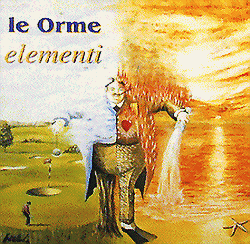 Le Orme- Italian for `the footprint, started out in the `beat music' scene. The band included: Aldo Tagliapietra (vocals, acoustic guitar, flute, celesta), Nino Smeraldi (electric guitar, vocals), Claudio Galieti (bass, cello, vocals), Toni Pagliuca (keyboards), and Michi dei Rossi (drums, percussion), and after their Beatles/Magical Mystery Tour-like sound, began finding their own sound, becoming more progressive by 1971. They mixed the power trio sounds of the Nice with Italian elegance and sophistication, they were formed in 1967.
Le Orme- Italian for `the footprint, started out in the `beat music' scene. The band included: Aldo Tagliapietra (vocals, acoustic guitar, flute, celesta), Nino Smeraldi (electric guitar, vocals), Claudio Galieti (bass, cello, vocals), Toni Pagliuca (keyboards), and Michi dei Rossi (drums, percussion), and after their Beatles/Magical Mystery Tour-like sound, began finding their own sound, becoming more progressive by 1971. They mixed the power trio sounds of the Nice with Italian elegance and sophistication, they were formed in 1967.
After ELP was successful on the Italian charts in 1971, music producers were finally convinced that progressive music could be profitable and Le Orme were given the freedom to make- 'Collage.' This album milestone album gave birth to Italian prog bands- P.F.M., Banco, etc.
 In 1972 the Album 'Uomo di Pezza'(Rag Man) attained gold status, it recounted the unjust abuses of women. Production, composition and musicianship were vastly improved. `Alienazione' an excellent instrumental monster jam illustrated their ELP influences. The gold albums didn't end as 1973's, Felona e Sorona was the first Italian concept album and many believe, their finest work. The success was even noticed by `Charisma's Tony Stratton Smith, who enticed Le Orme to rerecord the album in English (Peter Hammill (Van Der Graaf Generator), translated the album's lyrics into english, which focuses on the story of two imaginary planets: " Felona and Sorona. Millions of light years apart, Felona- radiant with peace and love, while Sorona was an unhappy speck in eternal darkness.
In 1972 the Album 'Uomo di Pezza'(Rag Man) attained gold status, it recounted the unjust abuses of women. Production, composition and musicianship were vastly improved. `Alienazione' an excellent instrumental monster jam illustrated their ELP influences. The gold albums didn't end as 1973's, Felona e Sorona was the first Italian concept album and many believe, their finest work. The success was even noticed by `Charisma's Tony Stratton Smith, who enticed Le Orme to rerecord the album in English (Peter Hammill (Van Der Graaf Generator), translated the album's lyrics into english, which focuses on the story of two imaginary planets: " Felona and Sorona. Millions of light years apart, Felona- radiant with peace and love, while Sorona was an unhappy speck in eternal darkness.
In January of 1974, Le Orme recorded the first Italian Live album, then followed with Contrappunti, one of their most complex albums to date. Smogmagica was recored in the United States and was a commercial departure from previous work.
 After Contrappunti, the band added a guitarist and started to incorporate more folk, jazz, and classical influences into their music. Many personal changes ensued. By the time of `Storia O Leggendia,' and `Florian,' the group ditched their electronic instruments incorporating a chamber music touch, until the electronic album- `Venerdi.' Poor album sales caused the break-up of the band until 1986, when they regrouped but preferring to tour, they did not record in four years,
After Contrappunti, the band added a guitarist and started to incorporate more folk, jazz, and classical influences into their music. Many personal changes ensued. By the time of `Storia O Leggendia,' and `Florian,' the group ditched their electronic instruments incorporating a chamber music touch, until the electronic album- `Venerdi.' Poor album sales caused the break-up of the band until 1986, when they regrouped but preferring to tour, they did not record in four years,
 In 1992 longtime member- Tony Pagliuca left the band and was replaced by Michele Bon (keys.), and Francesco Sartori on the piano. In 1996, they presented a grandiose rock opera- a suite narrating the stages of a man's life in comparison with a River (possibly influenced by the paintings of Hudson River School Master- Thomas Cole's `Voyage of Life' series). Sadly, record companies were reluctant to embrace the album because it was considered too progressive'.
In 1992 longtime member- Tony Pagliuca left the band and was replaced by Michele Bon (keys.), and Francesco Sartori on the piano. In 1996, they presented a grandiose rock opera- a suite narrating the stages of a man's life in comparison with a River (possibly influenced by the paintings of Hudson River School Master- Thomas Cole's `Voyage of Life' series). Sadly, record companies were reluctant to embrace the album because it was considered too progressive'.
 Le Orme is still around and better than ever. They continue to tour, create and play fantastic Italian progressive music, they seem to have embraced their recording history and illustrate that on the road. They can be seen and heard from the recordings at Progfest in 1997 and more recently at another big Prog event- Bajafest. They continue to influence new progressive bands around the globe.
Le Orme is still around and better than ever. They continue to tour, create and play fantastic Italian progressive music, they seem to have embraced their recording history and illustrate that on the road. They can be seen and heard from the recordings at Progfest in 1997 and more recently at another big Prog event- Bajafest. They continue to influence new progressive bands around the globe.
On June 11 2001 the label Crisler has published `Elementi' a suite dedicated to the 4 elements composing the universe. Recently, Le Orme was going to play at NEarfest 2002, but whether it was ego or miscommunications, the band backed out.
Encouraged by the success of their concerts and strong sales of their 1970-1980 anthology, the band returned to the recording studio. The resulting product, 1995's Il fiume, a "triumphant return" to the sound that made them famous more than twenty years before. A string of concerts, culminating in appearances at progressive rock festivals in Los Angeles, Quebec City and Mexico City, followed. Two further albums were released, Elementi in 2001 and L'infinito in 2004, completing with Il fiume a trilogy around the concept of the "becoming" of the human being. Le Orme headlined NEARFest 2005, and later returned to a trio formation, playing concerts both inside and outside of Italy.
At the end of 2009, Aldo Tagliapietra left the band. He was replaced as lead singer by Jimmy Spitaleri of fellow Italian progressive rock band Metamorfosi.In 2011 the group released La via della seta a concept album inspired by the Silk Road.
 Discography
Discography
Studio and live
Ad gloriam (1969)
Collage (1971)
Uomo di pezza (1972)
Felona e Sorona (1973)
Later re-recorded in English and released in the UK as Felona and Sorona.
Contrappunti (1974)
In Concerto (1974, live)
Smogmagica (1975)
Verita nascoste (1976)
Storia o leggenda (1977)
Florian (1979)
Piccola rapsodia dell'ape (1980)
Venerdi (1982)
Orme (1990)
Il fiume (1996)
Amico di ieri (1997)
Elementi (2001)
L'infinito (2004)
La via della seta (2011)
Compilations
Beyond Leng (1976)


